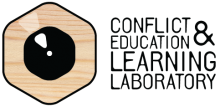Measuring the Impact
This research theme encompasses projects, research and expertise which assess the impact of textbook and other educational interventions on reducing divisive stereotypes, prejudice, and discrimination. Work may include field studies and experimental methods which test the hypothesis that the potential powerful influence of textbooks moves beyond the individual student, exploring effects within and outside the school, as well as peer influence.
